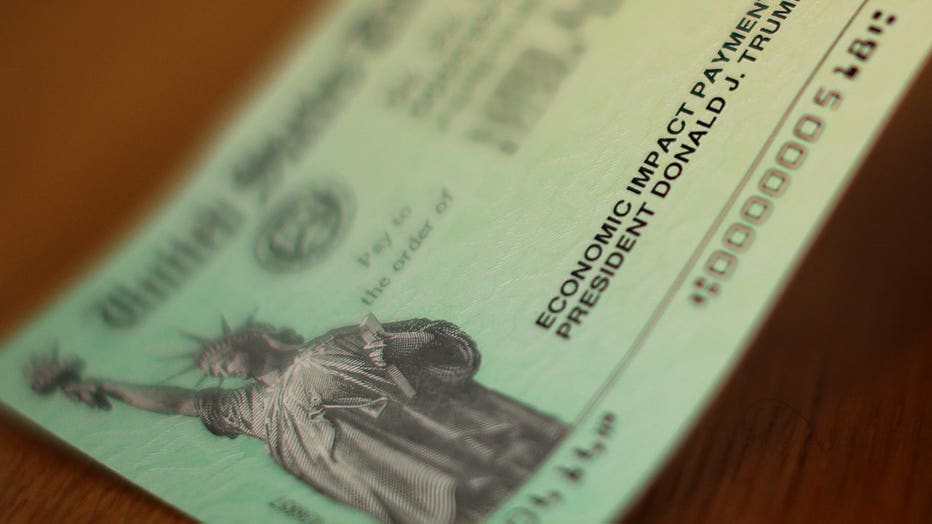Will Americans get a second $1,200 stimulus check? What we know
The fate of a second stimulus check was thrown into uncertainty last week when White House officials and Democratic leaders missed a self-imposed deadline to cut a deal on another round of emergency coronavirus aid.
President Trump, seeking to bypass Congress, instead signed four executive orders intended to provide American families and businesses with additional financial relief, including deferring student loan payments through the end of the year, discouraging evictions, postponing payroll taxes through the end of the year and extending jobless aid for out-of-work Americans by $400 per week.
Because the Constitution gives Congress, not the president, the authority to determine federal spending, the executive measures did not include a second $1,200 cash payment.
However, both Democrats and Republicans have indicated they support sending a second round of stimulus checks.
RELATED: Trump orders $400-per-week unemployment payments amid COVID-19 crisis, hits Dems for stonewalling
There are several bills that have been introduced in the House and Senate that would send another stimulus check to American families. Both the House-passed $3 trillion HEROES Act and the Senate-introduced $1 trillion HEALS Act include a second $1,200 payment for Americans, with the necessary qualifications nearly identical to the first stimulus check.

President Donald Trump's name appears on the coronavirus economic assistance checks that were sent to citizens across the country April 29, 2020 in Washington, D.C. (Photo by Chip Somodevilla/Getty Images)
In both proposals, individuals who earn a gross adjusted income of up to $75,000 and couples earning $150,000 would receive the full $1,200 or $2,400 payments, respectively. For higher earners, the checks will be reduced by $5 for every $100 in income and phased out entirely at $99,000 and $198,000.
However, the Democratic proposal would allow undocumented immigrants to receive the money, removing language that prohibited payments from going to anyone who filed taxes jointly with someone who used an Individual Taxpayer Identification Number.
Democrats would also increase the amount of money per child to $1,200 for up to three children, meaning that families could receive a maximum of $6,000 from the government.
The Republican proposal would keep the $500 amount for dependents established in the CARES Act but would modify it so families with dependents over the age of 17 will be able to receive the extra cash.
RELATED: Gone for good? Evidence signals many jobs aren't coming back after COVID-19 pandemic
A stand-alone stimulus check bill introduced by a group of GOP senators at the end of July would send a $1,000 stimulus check to eligible adults and children. Under the Coronavirus Assistance for American Families Act, introduced by Sens. Bill Cassidy, R-La.; Steve Daines, R-Mont.; Mitt Romney, R-Utah; and Marco Rubio, R-Fla., adults and children with Social Security numbers would receive a $1,000 check regardless of age or dependent status.
The senators said their bill is aimed at providing coronavirus assistance to families. For instance, a family of two parents and two children would receive $4,000 under their bill -- $600 more than they received under the CARES Act.
Both chambers would have to pass one of these bills (or a new one) that Trump would then sign into law before individuals receive more government-funded cash. It's unclear when -- or if -- negotiations on the next virus relief package will resume on Capitol Hill.
House Speaker Nancy Pelosi, during a "Fox News Sunday" interview, said the two parties "have to come to an agreement. We have to meet halfway." She stressed during a CNN interview that "of course there's room for compromise."
Treasury Secretary Steven Mnuchin, a lead negotiator for the Trump administration, told "Fox News Sunday" that he'll look at any new proposal put forward by Pelosi and Senate Minority Leader Chuck Schumer. He urged Pelosi to pass legislation on "things that we agree on" before returning to more divisive issues, like unemployment aid and money for cash-strapped state and local governments.
RELATED: US adds 1.8 million jobs in July, a dip from previous months
“On almost every other single issue we’ve reached an agreement,” Mnuchin said. “Any time they have a new proposal, I’m willing to listen.”
The impasse in negotiations puts at risk potentially trillions of dollars in aid for families, businesses and the U.S. economy, including a fresh round of $1,200 stimulus checks, extra unemployment aid for millions of out-of-work Americans, $100 billion to help reopen schools and relief for cash-strapped state and local governments.
Whether to extend the supplemental $600 a week in jobless aid has proven to be a key sticking point in negotiations. Democrats have maintained the sweetened benefits need to be extended through the end of the year, while Republicans have argued that it disincentivizes Americans from returning to jobs that pay less, a notion economists have disputed.
GOP lawmakers have proposed a $200-a-week replacement instead until states could adopt a more complicated system that would cap aid at 70% of a worker's former salary.
Get updates on this story from foxbusiness.com.

